Our picture of USSR was wrong
author
Uwe Wirthwein
Uwe Wirthwein grew up in southern Thuringia in Behrungen, just a few meters away from the heavily guarded German-German border. Due to the course of the border, two-thirds of the village was surrounded by the East German "anti-fascist protective wall". A special pass was required to even enter to the village. The border and isolation of the restricted area awoke Uwe's desire for freedom and adventure. Raised in the westernmost point of the Eastern Bloc, as student he later began undertaking illegal journeys to explore the east; he traveled through all the provinces of the Soviet Union, thus gaining an authentic and un-falsified picture of life in the multiethnic state. Uwe Wirthwein's childhood was dominated by the presence of military and surveillance; for example, whenever he was arrested by armed soldiers as a child for playing in a nearby forest. The desire to escape the "bastion" around him grew steadily. He met other like-minded individuals when he began his studies, and together they organized complex and illegal journeys throughout the Soviet Union. Transit visas in hand, the students would enter the USSR via Moscow. From there, they would begin their actual and illegal expeditions into the Siberian tundra; to the Caucasus to climb Mount Elbrus, the highest mountain of Europe; or to the remote mountains of Tajikistan. Today, Uwe lives with his wife and three children in his hometown in a self-built loam house. He speaks openly about his experiences of life on the border, and of the feeling of overcoming boundaries.
Postcard
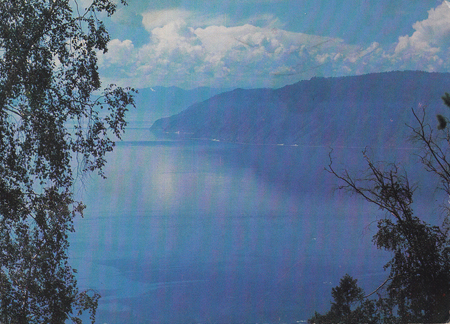
- Lake Baikal
- This postcard from Irkutsk shows Lake Baikal. The oldest and deepest freshwater lake on earth is covered with ice from November to March. The lake is connected to the Polar Sea by its only runoff, the Angara.
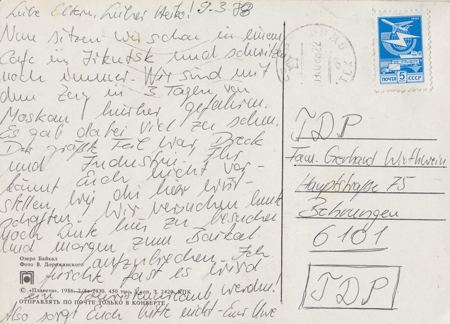
- Postcard Text
- "09.03.88. Dear parents, dear Heiko! Now we are sitting here in a café in Irkutsk and are still sweating. We traveled here by train from Moscow in three days. There was a lot to see. Most of it was dirt and industry. You couldn’t imagine what industry here looks like. We will still try to visit some people here today and set out for the Baikal tomorrow. I’m afraid it’s going to be a tourist vacation. So please don’t worry – Your Uwe."
- Behrungen
- Uwe Wirthwein grew up only a few meters from the Bavarian border. The idyllic village was enclosed on three sides by the border and was heavily monitored by numerous border guards and collaborators of the secret service. As a child, Uwe Wirthwein was even arrested a number of times for playing in the surrounding woods.
- (Red) Star
- The five-pointed red star, which is used here in the postmark as the symbol of CCCP (USSR), stands for the communist ideology. In a reinterpretation of the Star of Bethlehem, it should lead to a new world of classless society. There are also different theories and myths about the circumstances leading to the choice of this exact symbol: sometimes it was said to be the copied badge of British sailors, some other times it was the Russian revolutionist Leon Trotsky who only changed the color of the green star of the Esperanto movement. On many flags of communist countries, the communist star can be found in yellow on red background.
- Moscow-Irkutsk
- Irkutskist - a station of the Trans-Siberian Railroad, which runs from Moscow to Vladivostok. The distance between Moscow and Irkutsk is about 5185 km.
- Irkutsk
- The Siberian city of Irkutsk is located about 70 km away from Lake Baikal. Emerging at the end of the 17th century from a Cossack fort, the cultural significance for Siberia is mainly due to the Decembrists. These were critics of the tsarist system for the abolition of serfdom. Subsequently, they were often murdered or exiled to Siberia, where they still continued to spread their reformist ideas.
personal archives
Restricted Area
The seemingly idyllic community of Behrungen was surrounded on three sides by the East German border to the Free State of Bavaria and was hence secured by a strong military presence.
country: German Democratic Republic / year:
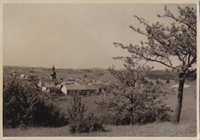
The seemingly idyllic community of Behrungen was surrounded on three sides by the East German border to the Free State of Bavaria and was hence secured by a strong military presence. Life in the Thuringian village was dominated by the permanent presence of the border forces as well as the isolation resulting from the restrictions regulating the area; for example, that no one could enter the area without expressed authorization ("pass of permission"). Uwe Wirthwein found the environment of the "bastion" as confining, oppressive and unnatural.
Behrungen Indians
In Behrungen, a child's natural love of adventure was curtailed by strict boundaries.
country: German Democratic Republic / year:
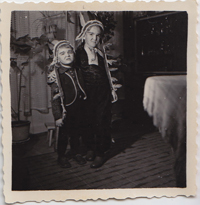
In Behrungen, a child's natural love of adventure was curtailed by strict boundaries. A troop of 89 border soldiers was stationed in the small village. Among other things, they made it their duty to arrest Uwe Wirthwein and his younger brother whenever they would play in the nearby forest. The children would be taken away at gunpoint and berated by the military police, who would then inform their parents of the "offense" – although it was not officially forbidden to be in the forest. The natural result of such experiences was the development of the desire to escape the confinement.
Storming the Mountains
Uwe and his friends, atop of a summit of the Tian Shan Mountains in Central Asian Turkestan.
country: Soviet Union / year:
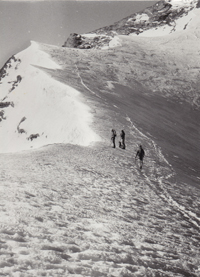
Uwe and his friends, atop of a summit of the Tian Shan Mountains in Central Asian Turkestan. Between 1984 and 1989, Uwe Wirthwein undertook a total of seven journeys within the Soviet Union. He saw himself primarily as an adventurer seeking the intensive encounter with nature and people while traveling. Thus, the trips were less and expression of political protest than of curiosity and adventurousness.
Mountaintop Party
At 5,500 meters above sea level, Uwe and his friends celebrate the conquest of the Tian Shan.
country: Soviet Union / year:
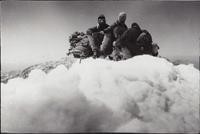
At 5,500 meters above sea level, Uwe and his friends celebrate the conquest of the Tian Shan. The experience with heights helped finance the next journey: the young engineers earned substantial supplementary hazard pay for doing "high-altitude, scaffold-free construction" for Dresdner construction companies.
Encounters
Again and again during their travels, the students would meet local inhabitants and experience the authentic life far outside of that reflected in Soviet propaganda.
country: Soviet Union / year:
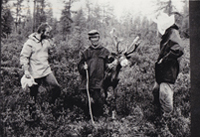
Again and again during their travels, the students would meet local inhabitants and experience the authentic life far outside of that reflected in Soviet propaganda. While there, they were often referred to as "nasch pribaltiki", or "our non-Balts". With this description and their foreign appearance, they could justify their rather meager school Russian. Among the bizarre experiences of hospitality enjoyed was also the spontaneous invitation to a funeral ceremony where, due to the prohibition under Gorbachev, only high-proof homemade schnapps was drunk.
"The Next Step Was Always Unknown."
The complicated journeys into the unknown were prepared secretly and with self-manufactured materials.
country: Soviet Union / year:
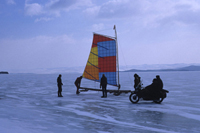
The complicated journeys into the unknown were prepared secretly and with self-manufactured materials. For example, old and inaccurate military maps were used to plan a Siberian river trip. Each participant obtained a portion of the needed materials for the boat, which was constructed in a vacant, back-courtyard apartment in Dresden. They left with each person carrying individual boat parts and 36 kilos of luggage, and then reassembled the boat on location. Spare parts were just as nonexistent as a "Plan B".
Headstand
This photo was taken on a trip with a homemade iceboat across Lake Baikal; with a depth of 1,642 meters, it is deepest freshwater lake in the world.
country: Soviet Union / year:
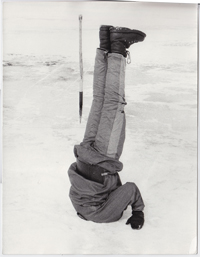
This photo was taken on a trip with a homemade iceboat across Lake Baikal; with a depth of 1,642 meters, it is deepest freshwater lake in the world. At that time of the year, the lake is completely covered with a sheet of ice. The travelers did like the local fishermen and sawed fishing holes into the ice, but they only caught one finger-sized fish.
Officially Adventurous
Uwe's duty in the preparation of the Siberian river trip was the creation of a logo.
country: German Democratic Republic / year:
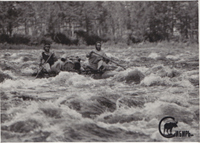
Uwe's duty in the preparation of the Siberian river trip was the creation of a logo. The logo designed by Uwe, which is printed at the lower right of the photograph, is in Cyrillic and reads "Sibir'89", whereby the Cyrillic "S" – which looks like a "C" – is furnished with a moose. The logo was glued onto all items: the floats, clothes, equipment. This was meant to make the tour look official as possible, and therefore legal.
Dresden
Uwe went to Dresden to study, thus escaping the apathy of the restricted area. He also began to get more politically informed and involved.
country: German Democratic Republic / year:
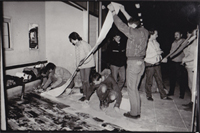
Uwe went to Dresden to study, thus escaping the apathy of the restricted area. He also began to get more politically informed and involved. A photographer had official permission to photograph the crowds at train stations. Uwe and his friends helped him later to put up the photographs, whereby despite having official permission they were repeatedly threatened with arrest.
River Trip
To the heavy luggage of Uwe and his friends belonged next to vital equipment also a 16mm camera, with which the unique adventures were captured on film.
country: German Democratic Republic / year:
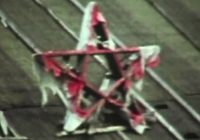
To the heavy luggage of Uwe and his friends belonged next to vital equipment also a 16mm camera, with which the unique adventures were captured on film. Here you can see among others the encounter with Anton, a local, and his elk as well as the construction of a catamaran and the subsequent river trip with it. A logo specifically designed by Uwe for this trip is clearly visible on the jackets. It reads in Cyrillic letters "Sibir'89" where the Cyrillic S, then a C, is larger and furnished with a moose. The logo was put on all items - float, clothing, equipment. Hereby, the whole tour was supposed to appear official and thereby as legal as possible.
Iceboats
To the heavy luggage of Uwe and his friends belonged next to vital equipment also a 16mm camera, with which the unique adventures were captured on film.
country: German Democratic Republic / year:
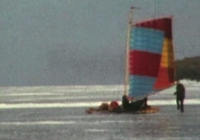
To the heavy luggage of Uwe and his friends belonged next to vital equipment also a 16mm camera, with which the unique adventures were captured on film. The young engineers built the iceboat seen in the clip on the basis of an East German cartoon film and read for further information on the subject “Der junge Segler” (the young sailor). With this superficial expertise, they succeeded their sailing trip on the frozen Lake Baikal, the deepest lake in the world.